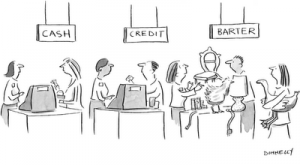 The word barter conjures up images of days gone by, where I might offer you a number of my chickens in exchange for one of your pigs. Or maybe I would have helped you work your field if you helped me build my barn.
The word barter conjures up images of days gone by, where I might offer you a number of my chickens in exchange for one of your pigs. Or maybe I would have helped you work your field if you helped me build my barn.
While both of those examples certainly do exemplify what barter is, modern bartering has become somewhat more complex. Bartering has been around for centuries, but like everything else in modern life, it has become more complex.
WHAT EXACTLY IS BARTER?
Barter, as suggested by the example above, is basically the trading of goods or services without the use of money. If a mechanic were to fix the car of a plumber in exchange for having a leaky pipe repaired, and no money changed hands, that would be barter. Another example might be someone trading an unwanted item for something more desirable.
Even kids on the playground trading baseball cards are bartering.
Once upon a time, this may have been a relatively easy affair. Each party would negotiate until they both were in agreement. Today, there may be other forms of exchange, such as credits, as used by some barter clubs, wherein members can earn credits by providing goods and services, and then later spend them on the goods and services of other members.
Today, we have more considerations to look at, because while the average person might think of barter as a simple exchange, the CRA does not, meaning that barter transactions are considered taxable.
THE VALUE OF TRADE
Barter, outside of specific circumstances, is considered taxable. When considering barter transactions, the CRA has determined that the goods or services that you are giving away should be considered to be paid. The exact amount of payment that you are said to be receiving is equal to the market value of whatever you are providing to the other party. This is true even if the value of what you receive in trade is not equal to what you give away.
Does this mean that everything that you trade will require you to determine its value in order to declare it as income? No. There are trades that are not considered taxable.
Keep in mind that you are also able to deduct the cost of the items or services that you are giving away when calculating the tax to be paid on the transaction.
EXCEPTIONS TO THE RULE
The tax implications imposed on barter are concerned with the trade of goods and services for which you would normally be seeking payment. For example, if you are a plumber and you agree to fix a drain for an electrician who in turn does work for you, that would be taxable, as it is a service that you normally provide in exchange for money as part of your business.
If, however, you are a plumber who happens to be very knowledgeable about cars, and you help a neighbour fix their engine in exchange for something that they offer you, then you needn’t be concerned, as this is not a service that you routinely offer as part of your business.
As long as the transaction does not involve you giving away goods or services that are typically paid for, they should be exempt from taxes.
Barter, while useful, can present potential tax problems if not handled and documented correctly.
Need help? Contact us so you can make sure that you’re compliant with the CRA tax rules. While we may not be able to tell you whether your kid got a fair trade on his baseball cards, we can let you know which barter transactions must be included in your financial records.
***This blog is for information only and not to be used as tax advice or planning without first seeking professional advice. Information is subject to change without notice.
